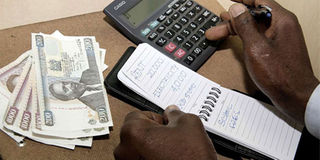Political threats stand in way of long road to economic recovery

A financially conscious Kenyan draws up his budget. Political threats stand in the way of economic recovery. PHOTO | DIANA NGILA | NATION MEDIA GROUP
What you need to know:
How long the economy remains in distress will depend on the outcome of the poll and how soon it takes for political temperatures to cool down.
The cost of this election has been estimated at over Sh100 billion and the fresh poll will gobble up a further Sh12 billion.
This huge expenditure, which is funded by taxpayers, is a major strain on public resources.
Save for 2013, the first elections under the 2010 Constitution, Kenya has a history of economic slow-down during election years.
This year is likely to be more difficult and painful. It’s the first time a presidential election will be repeated, on October 17, and the uncertainly is making investors overly nervous.
The latest projections by Stanbic Bank and Citi Research Economists slash the gross domestic product (GDP) growth for 2017 to under 5 per cent. Stanbic’s is down to 4.8 per cent from 5.2 per cent.
The African Development Bank (AfDB) was optimistic before the August 8 General Election, projecting an economic expansion of over 6.1 per cent in 2017 and 6.5 per cent in 2018. This will have to be revised to reflect the emerging sentiments and realities.
CRISIS
The magnitude of the crisis, sparked off by the Supreme Court nullification of President Uhuru Kenyatta’s re-election, will depend on how the Independent Electoral and Boundaries Commission conducts the fresh poll and whether the outcome will decisively settle the scores between the two contestants.
The unfolding situation makes the future unclear. While the president and his Jubilee Party have confirmed their readiness, Mr Raila Odinga and other National Super Alliance leaders are preoccupied with attacking the IEBC, questioning its integrity and demanding key changes ahead of the new poll.
This is causing stress to the economy and fuelling a confidence crisis as losses to the private sector from foregone investments and disruption of business.
Following the September 1 ruling by Chief Justice and President of the Supreme Court David Maraga, Kenya lost potential investments of Sh100 billion, according to the Kenya Private Sector Alliance. The decision shook the financial markets, causing the Nairobi Securities Exchange to be shut down temporarily.
OPPORTUNITIES LOST
More opportunities will be lost because investors don’t gamble with their money in unstable or unpredictable markets and economies.
Even international development agencies would rather wait to see how and when the political stalemate will be resolved before committing new funds to programmes.
How long the economy remains in distress will depend on the outcome of the poll and how soon it takes for political temperatures to cool down.
Economic recovery after a crisis is always painful. The cost of the elections and the political fallout that follows are major setbacks to quick recovery.
IMPACT
The cost of this election has been estimated at over Sh100 billion and the fresh poll will gobble up a further Sh12 billion.
This huge expenditure, which is funded by taxpayers, is a major strain on public resources.
The political impasse is likely to hurt Kenyans even more as it will deepen the impact of the adverse social and economic factors prevailing over the past year.
The economy is still recovering from the drought that has persisted since last year, causing acute food shortages and reduced supply of agricultural produce to food processing industries.
The government has spent billions of shillings on massive imports of grains and cereals to prevent widespread hunger.
RATE CAPS
The business sector has also suffered from the banking industry response to the interest rate caps imposed by the government last September, which have effectively reduced the volume of credit, particularly to micro, small and medium enterprises.
Kenya is at risk of not achieving its magical 7-10 per cent economic growth, considered necessary for accelerated sustainable economic transformation.
Political threats to the economy have increased, forcing a diversion of more time and resources to a bottomless pit at the expense of development.
Hopefully, the stalemate will be resolved once and for all, to give Kenyans space to continue creating wealth and jobs.
Mr Warutere is a director of Mashariki Communications Ltd. [email protected].





